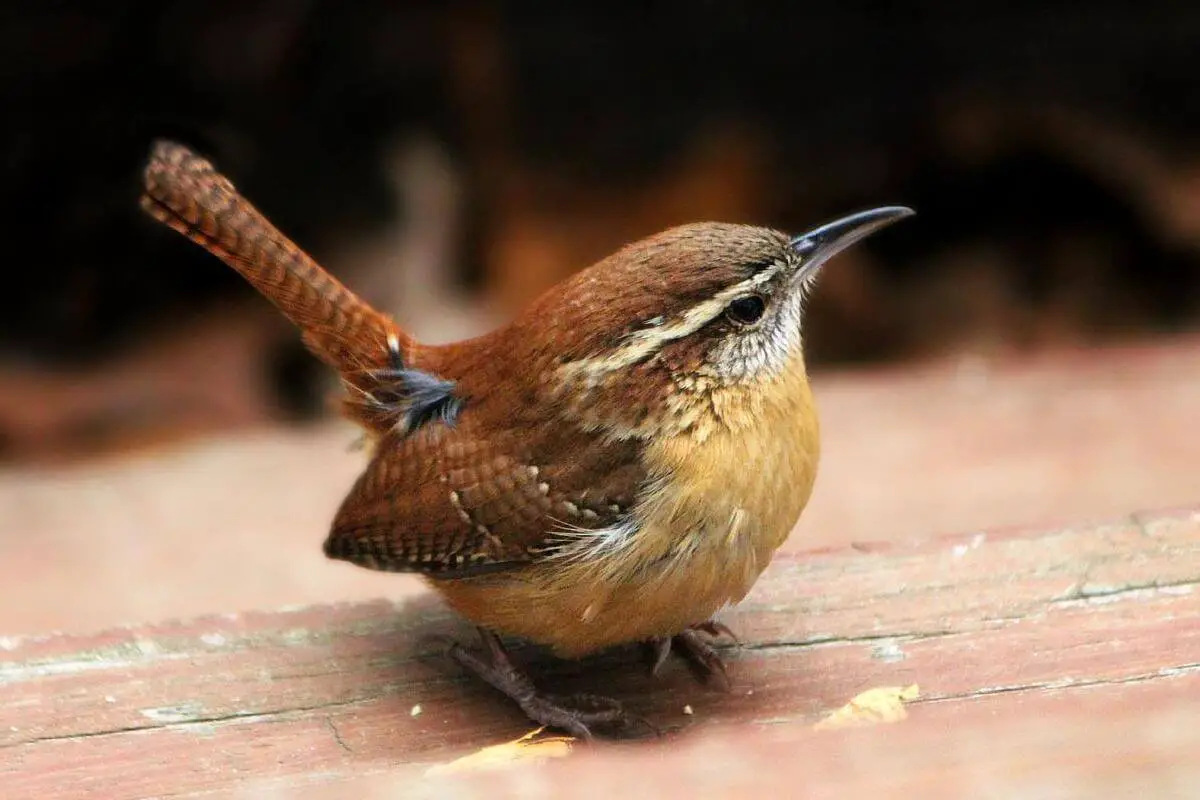It’s really surprising to get the glance of a cute little Carolina Wren perching in the corners of your porch.
But why did the bird choose that corner space? Is it feared, or is it just roosting? And what do you need to do? Read on till the end to get all the helpful insights!
Here’s Why Carolina Wren Sleeps In Corner:
Typically Wrens are cavity-nesting birds which means they build nests and raise their young ones in sheltered cavities. So if you spot a Carolina Wren sleeping in the corner of your porch, it is likely that the bird loves the space and would nest there.
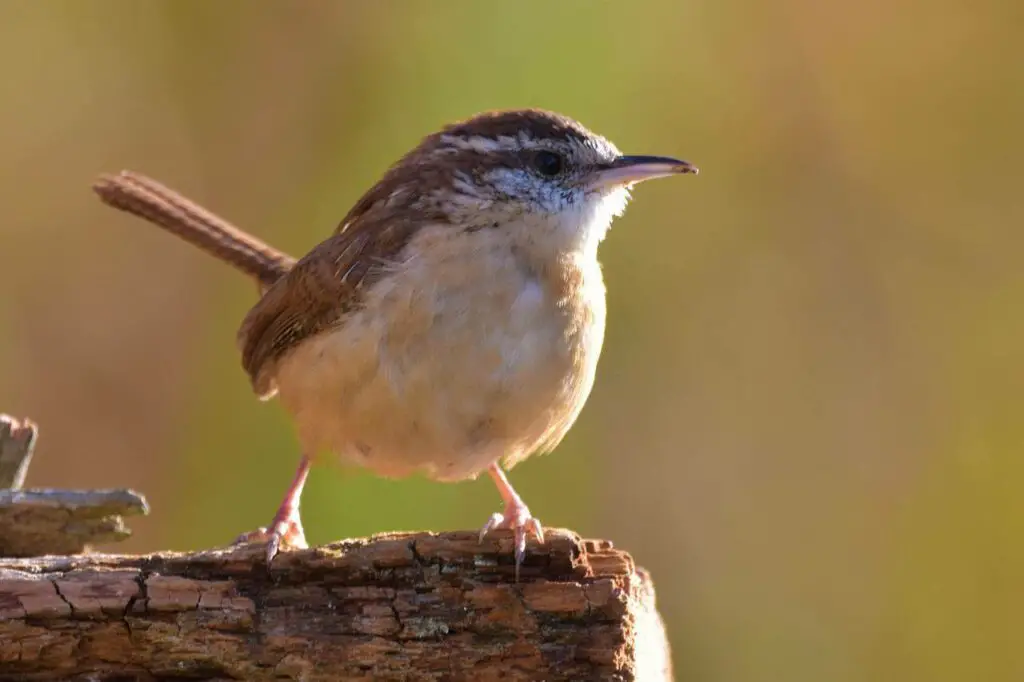
A cavity-nesting bird (like Wren) relies on nesting shelter from other sources and builds its nest within that shelter. There are mainly two types of cavity-nesting birds:
| Bird Type: | Description: |
| Primary Cavity Nesting Bird | These birds make their own cavity, like birds such as woodpeckers that drill chambers in trees. |
| Secondary Cavity Nesting Bird | These birds use existing cavities (natural, artificial, or the ones excavated by primary cavity nesters). Most birds that use nest boxes or birdhouses belong to this group. |
Although some wrens prefer to build their own elaborate structures, some species can be curious to seek out artificial structures.
Regarding nesting, the Carolina Wrens seem to follow no limitations!
Be it your garage, an empty can, or an old pair of shoes; you can find this small chunky bird just anywhere 😉 They love nesting around humans.
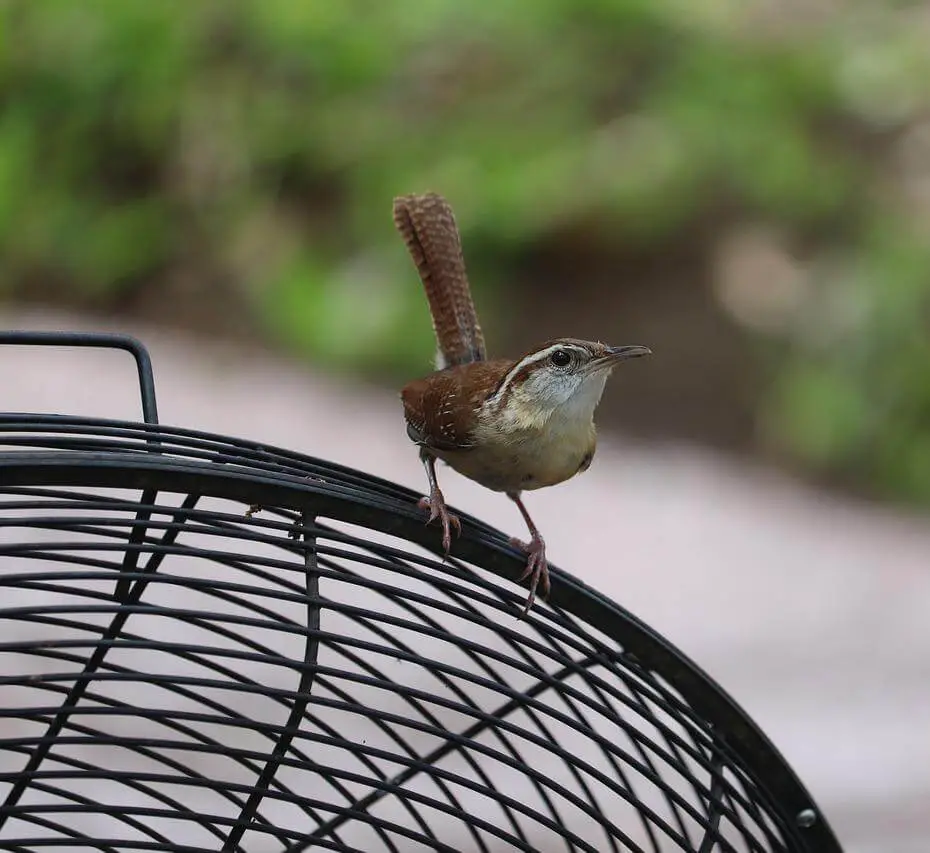
They have adapted well to the life of cities and suburbs. And one of the reasoning behind that is their eagerness to nest in just about anything!
If food is available, Carolina Wrens often come to the backyard to visit your feeders in winter.
During the cold winter times, they take shelter in nest boxes that have dried grasses.
In the springs, they can nest in boxes or select an empty flower pot kept in the quiet corner of your overgrown backyard. So that’s how they are!
Some of the other reasons why a Carolina Wren might prefer to sleep in the corner are as follows:
- It’s the chilling winter nights, and the Carolina Wren feels more warmth by fluffing and tucking up in the corner.
- Or maybe, the predators are around, and the Carolina Wren feels more secure resting in the corner.
It is also worth noting that Wrens can be competitive, and they can aggressively chase each other from their nesting places. In addition, Carolina Wrens defend their territory by constant singing.
So an open space with many houses offers them more chances to explore and find just the right spot!
Did you know? A Male Wren can even build up to 12 nest for their partner. However, only one serves as a home.
Do Carolina Wren Sleep In Corner Out Of Fear?
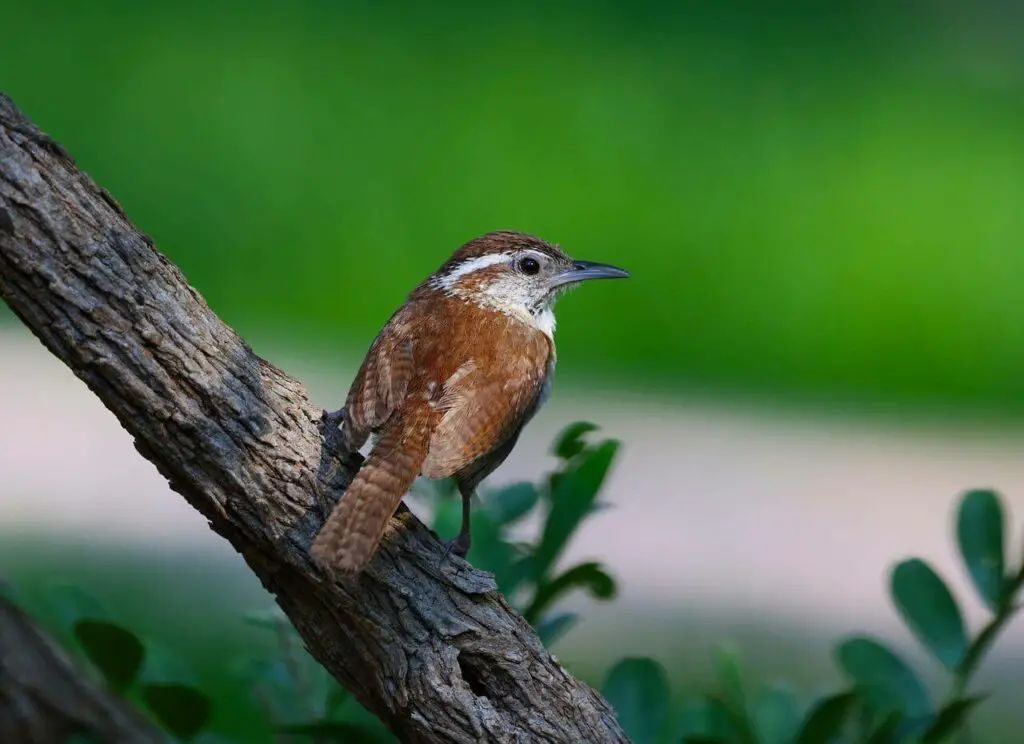
If the predatory birds are around, the chances are high that the Carolina Wren is resting in the corner out of fear of them. Some of the most likely predators of an adult Carolina Wren include Copper’s Hawks, Sharp-Shinned Hawks, and Blue Jays.
Moreover, some of the animals that tend to eat Carolina Wren’s eggs and nestlings are:
- Raccoons
- Gray Squirrels
- Eastern Chipmunks
- Mink
- Gray Foxes
- Black Rat Snakes
Usually, both male and female Carolina Wrens tend to use alarm calls to defend their nest from predators. Sometimes, when predators are near, they can even chase after them or peck at them.
But given their small size, it is better to take adequate precautions and keep our little buddy safe from predators.
For example, you can cover and shield your bird feeders.
If you love the presence of birds around, you likely already have bird feeders on your property.
But it turns out that this can also become danger spot for the Carolina Wren.
Birds like hawks typically look for their from above. Once they figure out the hanging spot of small local birds, they are ready to take the dive and scope your favorite wren.
But what if the hawks couldn’t see? Well, that’s what you can do to ensure safety and for that, keep the bird feeder under a shade like an umbrella or a low-hanging tree.
In addition, you can also get a caged-bird feeder to ensure the safety of the Carolina Wrens. The hawks won’t be able to get hold of them because of the bars.
What To Do When A Carolina Wren Sleeps In The Corner?
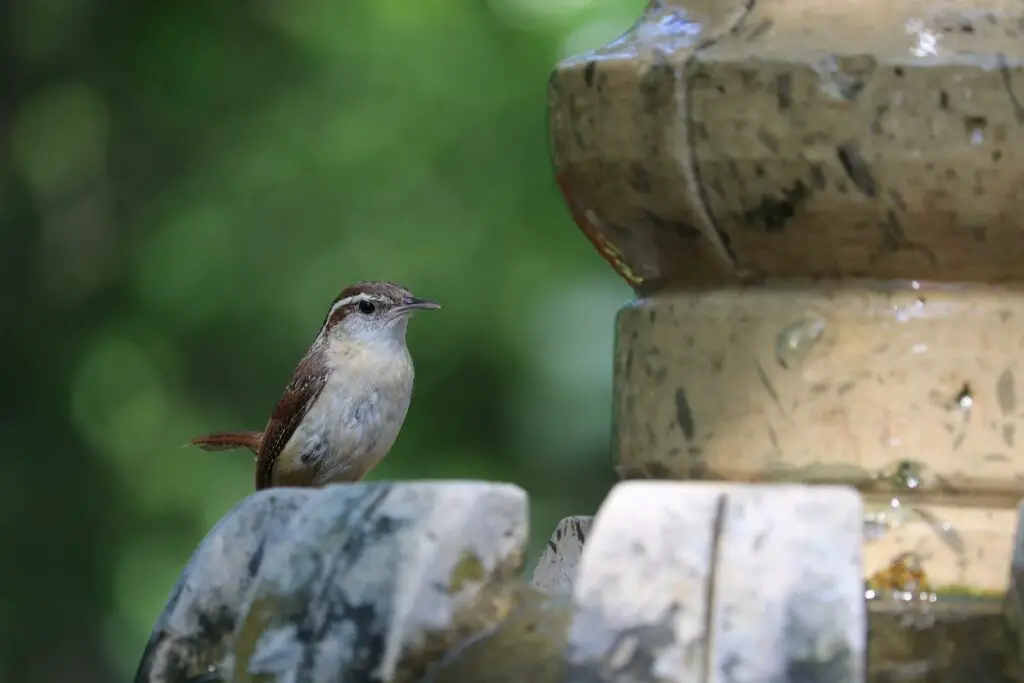
First thing first, closely observe the Carolina Wren roosting in the corner.
Does it look injured, or is it healthy?
#1. Here’s What To Do If The Bird Looks Injured:
If the bird seems injured, you need to confine the bird.
Take a covered box and punch some air holes in it. Then place the injured Carolina Wren in it. If the injury is serious, like if you notice missing major parts of feathers or if blood is coming out, quickly reach out to your local rehabilitation center.
In the meantime, no need to force-feed the bird or give water to it.
If the injury is light and not so serious, you can leave the bird alone for a few hours. The bird will likely fly away on its own once you release it.
After every fifteen minutes or so, take the bird outside and open the box to give it a chance to fly away. But if things don’t seem right, don’t hesitate to contact the local wildlife rehabilitator.
Never take a chance; be sure to judge the situation the best you can and act accordingly.
#2. Here’s What To Do If The Bird Looks Healthy:
If the bird looks healthy and is simply roosting in the corner, then take a sigh of relief!
But still, if there are predators around, it is essential to offer the Carolina Wren every possible safety.
Do You Need A Bird House For The Carolina Wren?
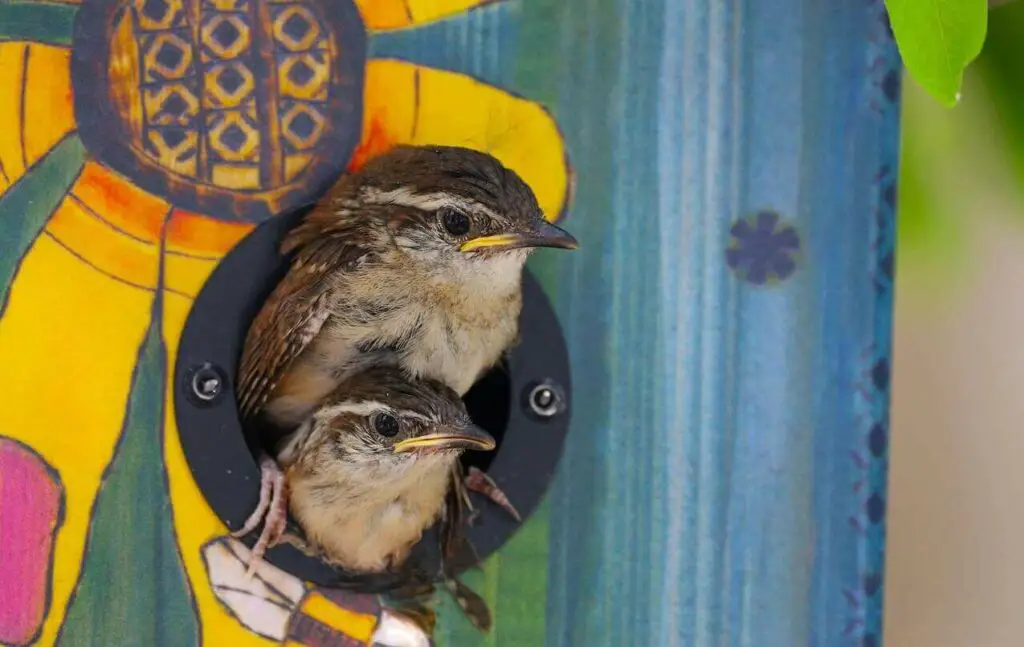
If you found a Carolina Wren roosting in the corners of your porch, likely, the little buddy won’t pay much attention to a birdhouse. However, you can still try; if you are lucky, the wren can house in it!
Even though there are tree cavities or nest boxes, Carolina Wrens are found to prefer unusual nest sites.
Be it a garden pot, a mailbox, or a shoe left outside for long hours; you can find a Carolina Wren nesting!
Moreover, they are also found nesting in old coat pockets!
That said, nesting boxes can offer the wrens a more convenient place to place their nest. In addition, they can remain safe from predators. So why not give it a try!
When it’s the breeding season, a breeding pair of Carolina Wrens often looks for nest boxes so that they can use them and build their nest.
Hence, putting up the nest box right before the breeding season begins is essential. Doing this will allow the pairs to familiarize themselves with the location and know that it is kept for their use.
It is essential to ensure enough ventilation and drainage holes are present to hold even a large brood without any discomfort.
You can also provide things like fur, feathers, twigs, leaves, and grass so that the wrens have enough choices regarding nesting materials.
What Do Carolina Wrens Eat?
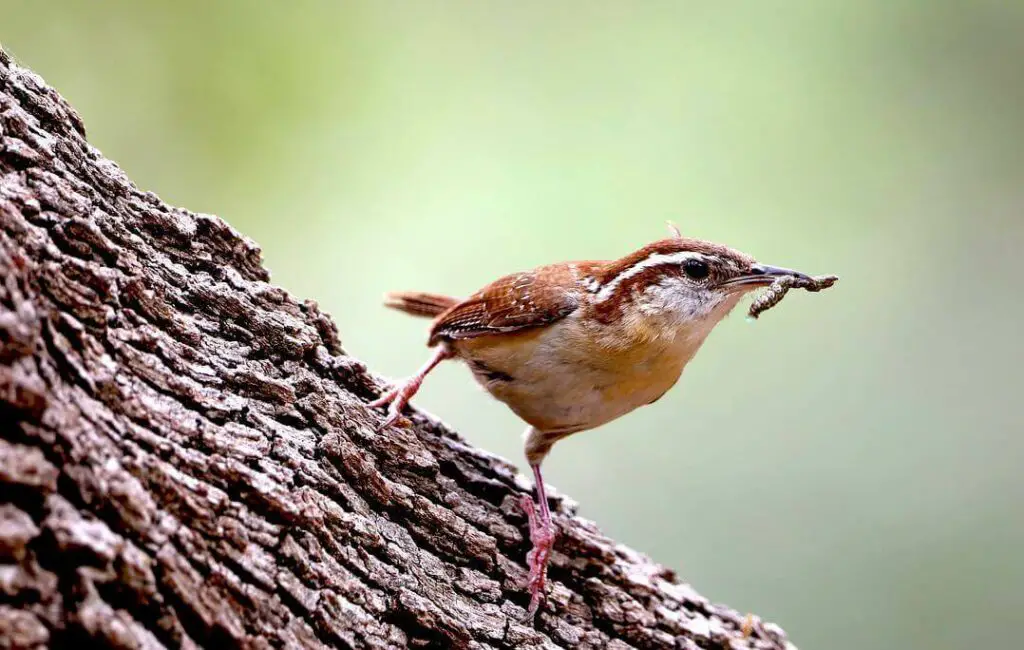
Carolina Wrens are mainly insectivorous birds. So they eat various insects and spiders, feeding mostly on the grounds. They eat different types of insects, such as caterpillars, grasshoppers, true bugs, and many others.
They look for food in decaying logs, under tree barks, and under brush piles.
They come to birdfeeders sometimes for peanuts, suet, and other items.
Being a ground feeder, they struggle to survive long winters when there’s a lot of snow around. So when winter is in full swing, they rely on bird feeders for food.
So if it’s winter, keep your bird feeders updated with feedings for your new buddy, the Carolina Wren.
Final Thoughts
In short, the most likely reason a Carolina Wren sleeps in the corner is that they prefer such locations for nesting. However, there can be other reasons, like the bird is taking shelter in fear from a predatory bird or just resting for the required warmth.
So I hope now you know why the Carolina Wren is perching on the corner of your porch.
I wish the Carolina Wren keeps visiting you again and again and feels you with delight. Best of Luck! Observe them whenever you can and take necessary care as needed!
Enjoy the beauty of nature and happy birding 🙂 See you again!
I think you’ll also like checking out these posts:

